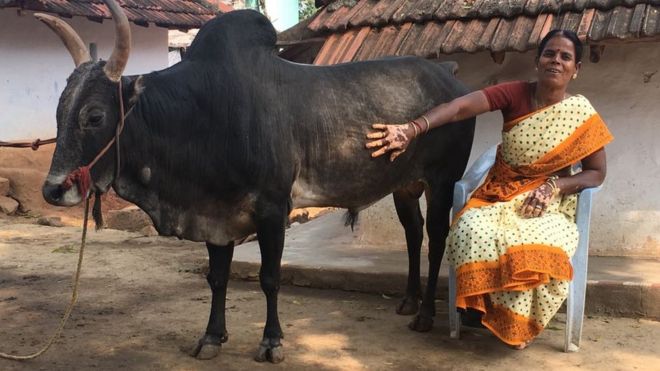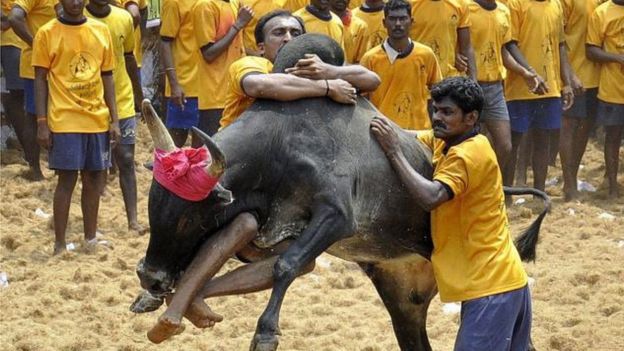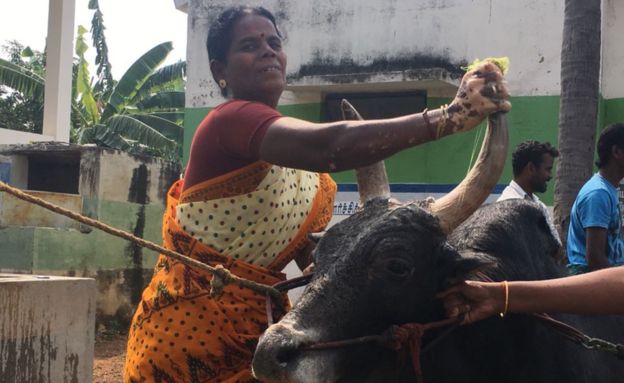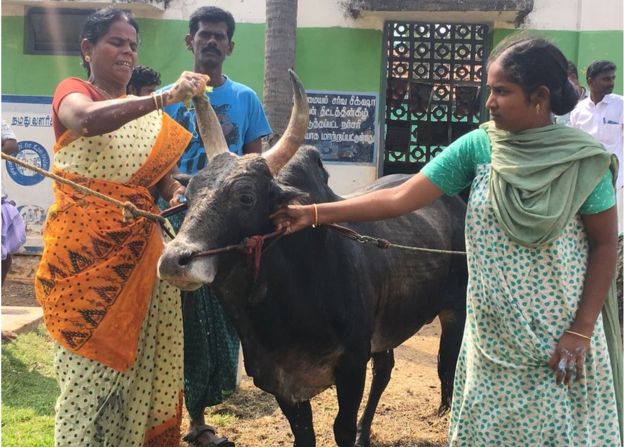
Selvarani Kanagarasu, a daily wage labourer from the south Indian state of Tamil Nadu, has shunned marriage so that she can take care of a prize-fighting bull. BBC Tamil's Pramila Krishnan talks to her about her life.
Ms Kanagarasu, now 48, was only a teenager when she decided that she wanted to follow in the footsteps of her father and grandfather, who raised bulls that competed in the state's traditional bull taming contests known as Jallikattu.
Jallikattu has been popular for centuries in Tamil Nadu and is traditionally practised during the harvest festival of Pongal in January. Thousands of men chase bulls to grab prizes tied to their horns.
The sport was not practised for two years, following a ban by the Supreme Court on the grounds of animal cruelty. But following mass protests in the state, the federal government cleared the way for it to resume in January 2017, bypassing the ban.
"My father and grandfather both raised bulls and also considered them their children," she says.
- Jallikattu bullfighting set to resume in Tamil Nadu
- The state that loves bullfighting but isn't Spain
- Why India bullfighting ban 'threatens native breeds'
The task of continuing the family tradition would have ordinarily fallen to Ms Kanagarasu's brothers, but she says they did not have the time to look after the animals. So she decided to step in.
The bull she looks after, Ramu, is an 18-year-old animal who is a legend in local Jallikattu circles.
Ramu has won five of the seven Jallikattu events he has participated in, netting prizes like silk sarees and a gold coin for his devoted owner.
''Ramu is a son to me. He won prizes but more importantly, he won honour for my family in the village," she says, adding that Ramu is very "loving" despite his size and his temper in the Jallikattu arena.
Over the years, scores of people have been gored or trampled to death in the contests. Hundreds, including spectators, have been mauled or injured. In some arenas, coir matting from coconut trees cushions the impact of a fall - but it provides no defence against a raging bull.
What is Jallikattu?
 PANDIAN RANJITH
PANDIAN RANJITH- Jallikattu, more than 2,000 years old, is considered to be one of the oldest sports still practised in the modern era.
- The bull is released from the pen and bullfighters are supposed to hold on to the animal's hump for about 15-20 metres or three jumps of the bull to win the prize. If no one succeeds, the bull wins.
- During the event, hundreds of men will run along with the bull, hold on to its hump and pluck away bundles of money or gold tied to its specially sharpened horns.
- Unlike bullfighting in Spain, in Jallikattu the bull is not killed and the bullfighters are not supposed to use any weapons. The idea is to dominate and tame the animals.
- In recent years animal advocacy groups have pointed to tactics like tail-pulling as being cruel. The Supreme Court said that the use of bulls in the sport "severely harmed" the animals and was an offence under the Prevention of Cruelty to Animals Act.
- Over the years, scores of people have been gored or trampled to death in the contests. Hundreds, including spectators, have been mauled or injured.
She bought him when he was 10 years old. The owner initially asked for a large sum of money but he agreed to give Ramu to her for a token amount after she told him she wanted to raise the bull but could not afford the price he was asking.
Ms Kanagarasu's decision to look after the bull instead of getting married is highly unusual, particularly in rural India. She says her relatives and family members were initially upset, but eventually accepted her choice.
And her dedication has even won her respect from her family and other villagers, as she takes care of the bull despite barely earning enough to eke out a living for herself.
Her tiny house comprises only a kitchen and a single room, which also serves as a hall, eating space and bedroom. She earns only about 200 rupees (£2.28; $3.15) a day and uses almost all of it to make sure that Ramu is well cared for.
Given that he has to participate in competition, Ramu requires a special diet. Apart from the hay and rice bran most cattle are fed in Tamil Nadu, he also eats coconut, dates, banana, sesame, groundnut oil cakes, millets and rice.
It is a diet that is often more nutritious than what Ms Kanagarasu has for the day.

"There were days when I ate only one meal so I could save money to buy Ramu his food," she says.
Apart from his special diet, Ramu needs regular exercise. So Ms Kanagarasu takes him every day to the village pond so that he can swim and strengthen his knees.
"My nephew Rajkumar also takes him for walks and trains him to ward off challengers in the Jallikattu ring. And I get a fitness report from the veterinarian just before every Jallikattu event to ensure Ramu qualifies," she says.
Given Ramu's success in the arena, many people have offered to take the bull off her hands.
One of her relatives Indira Selvaraj says that she has turned away offers of more than 100,000 rupees for Ramu.

''She is interested in taking care of the bull. Preparing the bull for the sport is the only aim of her life. We failed trying to convince her to accept the offer. We are now convinced there is no price for pursuing one's passion", she told the BBC.
And although she has no children, Ms Kanagarasu has no intention of letting the tradition of raising Jallikattu bulls die with her.
She is currently training her 18-year-old niece, Devadharshini, to follow in her footsteps. But although Devadharshini says she knows how to take care of Ramu, she is not as convinced that it is what she wants to do for the rest of her life.
"I am not sure," she says.
"So far I have not thought about it. I am still studying and I wish to be the first female graduate in my family."

No comments:
Post a Comment